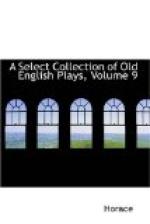Cigue f. Hemlocke, Homlocke, hearbe Bennet, Kex.—Cotgrave.
[405] Dry-meat is inserted from the copy of 1611.—Collier.
[406] Heir and heiress were formerly confounded in the same way as prince was applied to both male and female. So in Cyril Tourneur’s “Atheist’s Tragedy,” 1612, we have—
This Castabella is a wealthy heire.”
—Collier.
[407] We must here suppose that butler whispers to Ilford the place where the lady lies or lodges.—Collier.
[408] The following extracts from Stubbes’s “Anatomie of Abuses,” 4to, 1595, p. 57, will show the manners of the English in some particulars which are alluded to in the course of these volumes: “Other some (i.e., of the women of England) spend the greatest part of the day in sitting at the dore, to show their braveries, and to make knowne their beauties, to beholde the passengers by, to view the coast, to see fashions, and to acquaint themselves with the bravest fellows; for if not for these causes, I see no other causes why they should sit at their dores, from morning till noon (as many do), from noon to night, thus vainly spending their golden dayes in filthy idleness and sin. Againe, other some being weary of that exercise, take occasion (about urgent affaires you must suppose) to walke into the towne, and least anything might be gathered, but that they goe about serious matters indeed, they take their baskets in their hands, or under their arms, under which pretence pretie conceits are practized, and yet may no man say black is their eye.
“In the field’s and suburbes of the cities they have gardens either paled or walled round about very high, with their harbers and bowers fit for the purpose. And least they might be espied in these open places, they have their banquetting-houses with galleries, turrets, and what not, therein sumptuously erected: wherein they may (and doubtless do) many of them play the filthy persons. And for that their gardens are locked, some of them have three or four keys a piece, whereof one they keep for themselves, the other their paramours have to goe in before them, least happily they might be perceived, for then were all the sport dasht. Then to these gardens they repair, when they list, with a basket and a boy, where they meeting their sweet harts, receive their wished desires.”
[409] See note to “The Parson’s Wedding,” iii. 3.
[410] [A woman of loose character. Such was its ordinary acceptation, yet not its invariable one. See Lovelace’s Poems, by Hazlitt, 1864, pp. xl., xli., and 133, notes.] See note to “King Henry IV., Part II.,” edit. 1778, v. 522.—Steevens.
[411] [Edits., throw.]
[412] “Towards the rear of the stage there appears to have been a balcony or upper stage, the platform of which was probably eight or nine feet from the ground. I suppose it to have been supported by pillars. From hence, in many of our old plays, part of the dialogue was spoken; and in front of it curtains likewise were hung, so as occasionally to conceal the persons in it from the view of the audience.”—Malone’s “History of the Stage.” See his edition of “Shakespeare” by Boswell, iii. 79.




